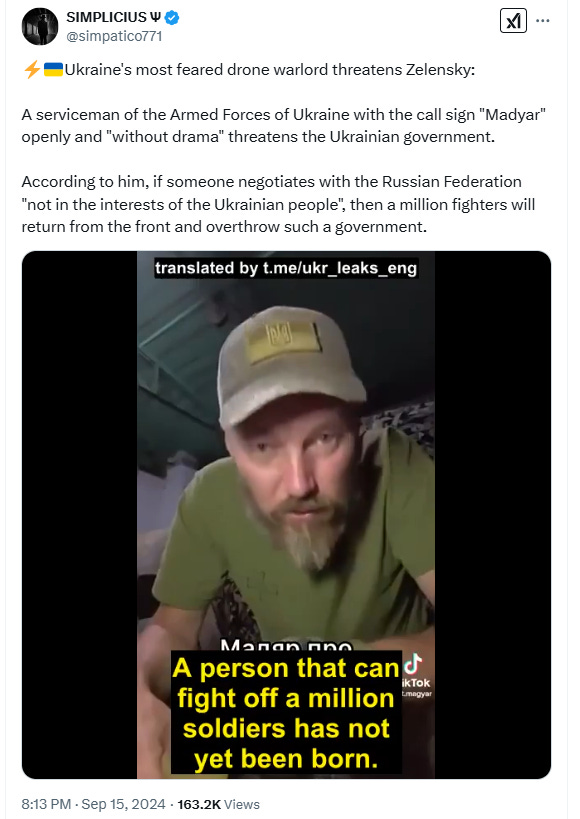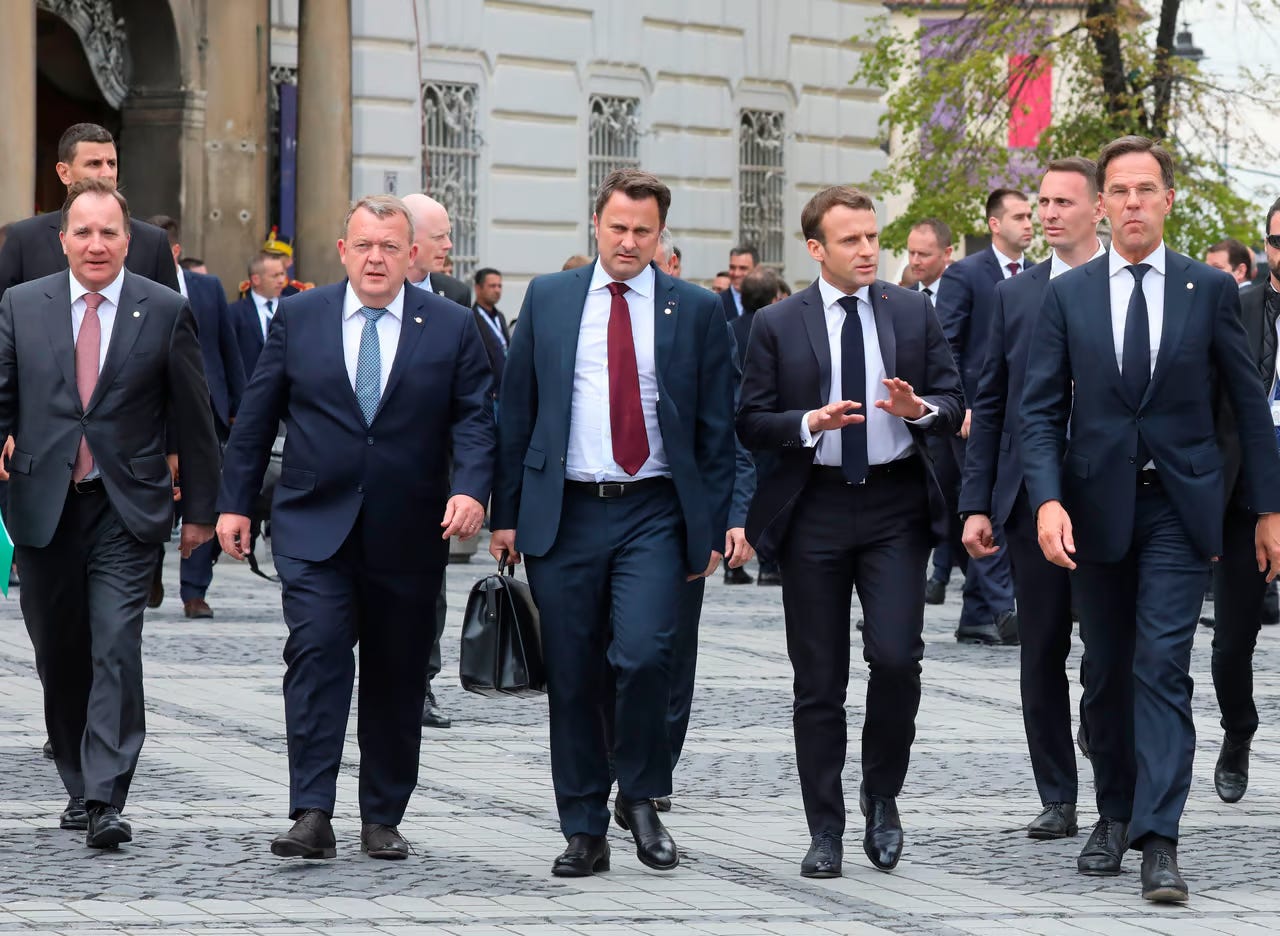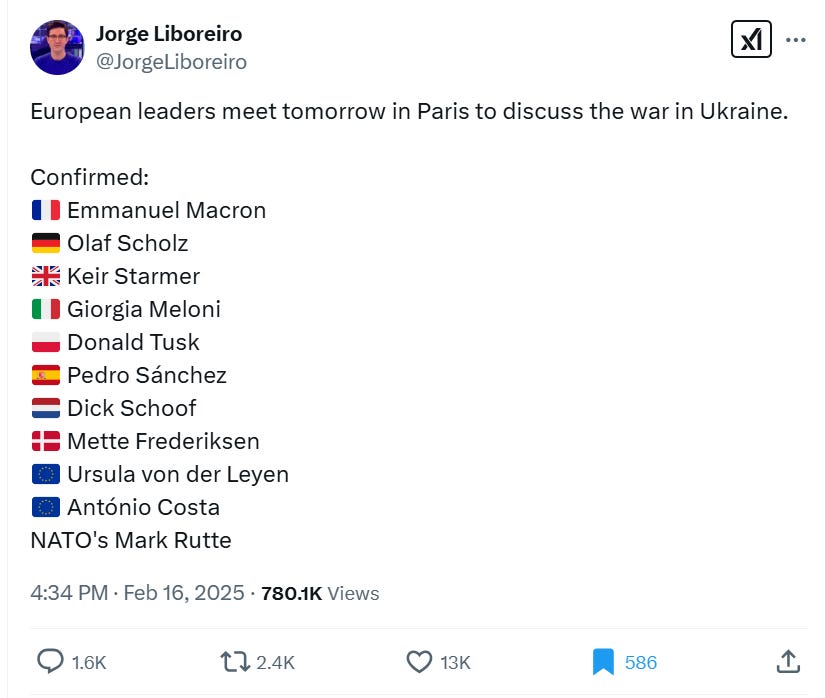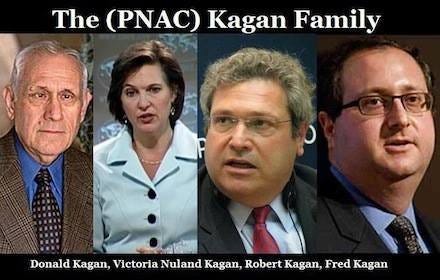The Eurocrat Putsch
As Uncle Sam compels Ukraine to cry uncle—daggers seek backs. A spectre haunts Europe—the jackals of Algeria’s doomed OAS—resurrecting as the U-OAS, before which Europe gathers to forge its mettle
In September 1959, at the peak of France’s savage colonial war in Algeria, Charles de Gaulle, the towering father figure of wartime resistance, stepped before the cameras and spoke words that shattered the illusions of an empire: L'autodétermination de l'Algérie. Algeria, he declared, would choose its own destiny—an implicit acknowledgment that France’s long and bloody struggle to hold its most prized colony was a lost cause.
De Gaulle’s vision was not merely one of retreat, but of recalibration. He saw that the age of colonial empires was over and that France’s future lay in Europe, not in clinging to an unwinnable war across the Mediterranean. More than just the blood and treasure spent suppressing the FLN insurgency, he understood the deeper cost of maintaining Algeria: the inexorable transformation of France itself. With millions of Algerians under French rule, full integration would mean remaking the nation’s identity—culturally, politically, and demographically. He did not reject Algeria out of weakness, but out of the conviction that holding on would destroy France from within.
Nevertheless, for the French colonial settlers in Algeria, from the humblest pieds-noirs to the highest-ranking generals, de Gaulle’s words were nothing short of treason. Had de Gaulle not come to power in 1958 under the promise of keeping Algeria French? Had he not reassured them, with his solemn authority, Je vous ai compris—"I have understood you"? Now, the man they had once cheered as their saviour was driving a dagger into their backs, handing Algeria over to the enemy—a ragtag band of third-world revolutionaries.
The outrage deepened in 1960 when de Gaulle, without consulting his military leadership or the hardliners in Algiers, initiated direct negotiations with the hated FLN. To those who had fought for l’Algérie française, this was not diplomacy—it was surrender. The French army, the once-proud force of Verdun and Austerlitz, was now being forced to cry uncle before guerrillas who had spent years planting roadside bombs and ambushing patrols in the mountains. The generals saw it as betrayal wrapped in the language of pragmatism. De Gaulle, they raged, had not only abandoned them—he had legitimized their terrorist enemy.
Resistance hardened. The generals, refusing to accept de Gaulle’s realignment, launched the putsch des généraux in April 1961, a military coup in Algiers aimed at overthrowing the French government. When this failed, the most fanatical among them turned to terrorism, birthing the Organisation Armée Secrète (OAS). The OAS saw itself as the last bulwark against surrender, waging a campaign of bombings and assassinations in both Algeria and mainland France. Their rallying cry: jusqu’au bout!—to the bitter end.
Yet history moved forward, indifferent to their defiance. In March 1962, de Gaulle signed the Evian Accords, granting Algeria independence. The OAS, desperate to derail the inevitable, launched a futile wave of terror. Even after France’s defeat, their hatred of de Gaulle did not fade. In their eyes, he was no longer merely a politician—they saw him as a tyrant who had betrayed the nation itself. The OAS made repeated attempts to assassinate him, the most famous of which took place at Petit-Clamart in 1962. This near-successful ambush was later immortalized in The Day of the Jackal, a novel and film that transformed the OAS’s vendetta into legend.
The OAS had sought to avenge what they saw as a betrayal—a dagger in the back—but their justice was crude, delivered at the muzzle of a gun. On August 22, 1962, they laid their trap. As de Gaulle’s Citroën DS 19 sped through the streets of Petit-Clamart, the jackals opened fire, riddling the vehicle with 187 bullets. The assassins had prepared their ambush meticulously, believing that sheer firepower would finish what history had already decided. Yet, in a moment that defied all logic, de Gaulle and his wife emerged untouched. Fourteen bullets struck the car, two tires were blown out, but the Citroën—renowned for its hydro-pneumatic suspension—stayed its course, allowing the driver to accelerate out of the kill zone. Fate, it seemed, had intervened.
De Gaulle himself dismissed the event with characteristic stoicism, remarking, “Cette fois c’était tangent”—“This time it was close.” But what is close to a statesman touched by history? To those who witnessed it, this was no accident. It was destiny, an act of providence, a sign that some men are shielded by forces beyond human comprehension.
The same sentiment would echo decades later when Donald Trump, mid-speech at a rally in Butler, Pennsylvania, became the target of another jackal’s bullet. By every measure of probability, the shot should have killed him. Instead, a sudden jerk of his head sent the bullet grazing his ear—proof, to some, that the hand of fate had once again intervened.
De Gaulle had met death with a soldier’s shrug; Trump, with the raw force of his nature. As the Secret Service rushed him offstage, he wrenched himself free, turning to face the stunned crowd. Blood streamed down his cheek as he thrust his fist into the air and bellowed, "Fight, fight, fight!" It was not scripted, not staged—just the unfiltered instinct of a reality-TV star who, in the one moment of ultimate reality, knew only to charge forward.
And yet, history does not always spare. Some bullets miss, others seek. A year after de Gaulle’s escape, John F. Kennedy would enter Dealey Plaza in an open-top limousine and never leave alive. His death, unlike Trump and de Gaulle’s survival, would be marked by another kind of magic—not the invisible hand of fate gently nudging a bullet towards safety, but a "magic bullet" twisting impossibly through bone and flesh, as if searching for its mark.
The Gathering Tempest
No statesman wants to stand exposed, wondering whether the bullet or drone will miss—or if it is already twisting through the air, searching. And so, before fate can decide for them, Europe’s leaders have chosen to do what they do best, organize a meeting.
Today, under the chandeliers of the Élysée Palace, they gather to forge their mettle—not on the battlefield, but at the conference table. The emergency summit in Paris is a last-minute effort to reclaim control of the war’s narrative. It is not Europe, they will argue, that is abandoning Ukraine. It is America.
The meeting comes in direct response to Washington’s sudden pivot. Days ago, Donald Trump and Vladimir Putin agreed to begin immediate negotiations to end the war—without Europe at the table. The announcement landed like a thunderclap in European capitals, where leaders had spent two years convincing themselves that transatlantic unity was unshakable. Now, with Trump and Putin taking matters into their own hands, the European alliance looks brittle, its influence suddenly in doubt.
UK Prime Minister Keir Starmer called the moment a “once in a generation” test for European security. French President Emmanuel Macron, positioning himself as the continent’s de facto leader, wasted no time in calling the emergency summit. Poland, ever wary of Russian designs, has already signalled its deep unease. From Berlin to Warsaw, from Brussels to London, the message is clear: Europe must not be cast as the betrayer.
And so the Eurocrats, like the desperate generals in Algiers, will refuse to accept that Ukraine must cry uncle. Not because they believe victory is possible—Europe’s leaders may seem obtuse, but within their military and intelligence circles, there are surely those who grasp the war’s trajectory with cold clarity. No, they will reject the truth because they know Ukraine’s hardliners view reality itself as betrayal—and any European admission of it as nothing less than a dagger in the back.

These hardliners—Azov, Kraken, Right Sector, and a constellation of radical nationalist battalions—have spent years preparing for this moment. Trained, battle-hardened, and bristling with Western weapons, they will not go quietly into defeat. Many have long vowed that if Ukraine falls, the real war will begin—not against Russia, but against the West they see as weak, treacherous, unwilling to finish the fight. Like the OAS before them, the U-OAS will not hesitate to turn their fury on their former patrons.
And so, in Paris, Europe will put on its bravest face. These bureaucrats-turned-putschists will gnash their teeth, rattle their sabres, and roar their defiance. They will thunder about here comes their 19th sanctions takedown—though each past measure has shattered against Russian resilience like glass against steel. They will pledge to send “peacekeepers” to Ukraine—never mind that doing so without Moscow’s consent would turn them into targets. Perhaps they will vow to confiscate Russia’s $250 billion in frozen central bank assets. Perhaps they will promise to arm Ukraine with nuclear weapons. Perhaps they will even whisper of deep strikes into Russia with Taurus missiles, their payloads nuclear-capable.
But it is all a pageant. None of it is meant to change the outcome of the war. It is meant to buy time. Because the Eurocrats know that if they do nothing—if they merely stand by and watch Ukraine collapse—then U-OAS will rise to take its revenge. And revenge will come not with declarations, but with car bombs in Berlin, assassinations in Brussels, drone strikes over Paris.
And yet, in this desperate bid to hold off one spectre, might they summon another? Bluff too hard, push too far, and instead of U-OAS drones over their capitals, they may wake to Russian hypersonics screaming toward their capitals, with Oreshnik area saturation daggers blotting out their airbases.
One thing is certain: today, under the golden glow of Parisian chandeliers, Europe’s leaders will curse Trump, just as the generals of Algiers cursed de Gaulle. They will call him a coward, a traitor, a weakling for conceding to Putin. But when a war is lost, when victory is a mirage flickering in the desert of reality—what takes more strength? The courage to seek peace, or the folly of prolonging the inevitable?
Crying Uncle
The uncle is often a liminal figure—neither father nor brother, bound by blood but outside the direct line of succession. And in literature, he is just as often a betrayer. Shakespeare’s Hamlet gives us Claudius, the quintessential evil uncle, who does what the father cannot—he murders the king, steals the throne, and corrupts the natural order. He is not the stern, guiding patriarch, but a cunning usurper, cloaked in false fraternity. Where a father leads, the wicked uncle manipulates. He feigns wisdom while plotting treachery, claiming to protect his nephew while ensuring the boy remains powerless.
Dickens, too, was fascinated by the treacherous uncle. In Nicholas Nickleby, the cruel and miserly Ralph Nickleby seeks not to kill his nephew but to break him—using deception, coercion, and financial ruin instead of outright violence. If Claudius represents the uncle as murderer, Ralph represents the uncle as strangler of potential, a figure who withholds support and plots ruin from the shadows. In both cases, the uncle is not a leader but a parasite, feeding off the legacy of the father while ensuring the son never rises to claim his inheritance.
Yet the uncle is not always a usurper or betrayer. In many stories, he is the bridge between worlds—the trusted guide who stands beside the heir, rather than above him. In The Lion King, Mufasa is the noble father, but it is the uncle-like figure of Rafiki, the shaman, who initiates Simba’s transformation and return. In Tolkien’s The Lord of the Rings, Bilbo, the eccentric uncle, bequeaths Frodo not just a treasure but a destiny, setting him on his journey. The good uncle is not bound by the rigid authority of the father; he can be a teacher, a protector, a trickster, or a negotiator. He does not command in the way a father does—he persuades, cajoles, and sometimes deceives, but always with an eye toward shaping the future rather than hoarding power for himself.
This liminality is what makes the uncle figure so powerful in both war and diplomacy. Unlike the father, who must uphold law and order at all costs, the uncle can move between roles, shifting from adversary to ally, from punisher to pardoner, from enforcer to negotiator. The best peacemakers are often uncles in this sense—figures who can wield both carrot and stick, who can chastise without alienating, who can pivot from war to reconciliation without losing face.
This is the space that Trump now occupies. He is neither the rigid patriarch of the old order nor the scheming betrayer lurking in the shadows. Instead, he plays the role of the ultimate liminal figure—the dealmaker who can scorn an enemy one day and shake hands with him the next. To many, this unpredictability is a weakness. But in the world of diplomacy, it is often the uncles, not the fathers, who make peace.
Yet not all uncles are wielders of power in the shadows. Some, like Uncle Tom, become symbols of deference, accommodation, and survival through submission. Over time, the name became a slur for those who yielded rather than resisted outright. But buried within the insult is an unspoken recognition: there is a different kind of strength in knowing when to endure rather than to fight. Unlike the father, who must stand his ground at all costs, the uncle can bend without breaking, can negotiate where others would perish in stubborn defiance. He is not always the wielder of power, but he knows how to move within it.
It is no coincidence that in English, to cry uncle means to admit defeat—to yield, to stop fighting, to accept reality. The phrase captures the essence of what an uncle represents: not the stern, unbending authority of a father, but the one who knows when the game is lost. And so, when great nations must make painful concessions, when the time comes to end wars rather than to win them, they do not send fathers to the negotiating table. They send uncles.
Charles de Gaulle understood the power of defiance. In 1940, when Europe had fallen and even his own country had surrendered, he refused to "cry uncle." He stood alone in London, the unyielding father of a broken France, insisting that the fight was not over. And history vindicated him.
But when he returned to power in 1958, he faced a different war—not one of national survival, but of national pride. Initially, he played the father, rallying France as though Algeria were its last stand. The generals believed him. They expected from him the same unshakable defiance he had shown in the Second World War.
But by 1960, he had already begun secret negotiations with the FLN, preparing the ground for an independent Algeria. To the hardliners, this was an unspeakable betrayal. They had followed him into war believing he would be their warrior-king, the patriarch of a French empire that would never die. Instead, he had become something else. He had become an uncle.
Donald Trump now stands at a similar crossroads. For years, he played the outlandish father figure for a wounded nation, vowing to restore what had been lost. But now, staring at the ruins of Ukraine, he prepares to make the same pivot De Gaulle once made. He will seek peace—not out of weakness, but because he knows the war cannot be won. And just like De Gaulle, he will be called a traitor for it. European leaders, still clinging to the fantasy of victory, will howl that he is abandoning them. Ukrainian nationalists, refusing to see the writing on the wall, will rage against his betrayal. And within America itself, the same voices that have demanded war all along will brand him an Uncle Tom for Putin, a supplicant before the Russian throne.
But Trump’s real heresy goes beyond Ukraine. Like De Gaulle, he is not simply ending a war—he is recalibrating America’s entire geopolitical posture. Just as de Gaulle saw that the cost of maintaining Algeria would one day break France, Trump has concluded that preserving America’s unipolar dominance is no longer sustainable.
The future, in his view, is multipolar, with the U.S., China, and Russia as the three great powers. Attempting to hold onto unipolar global primacy—militarily, economically, and politically—has only drained America’s strength, burdening it with endless wars, spiralling debt, and an unravelling domestic fabric.
If France’s withdrawal from Algeria was momentous, the United States stepping back from Europe would be nothing short of seismic. And just as de Gaulle was nearly overthrown for recognizing reality, Trump will face an all-out revolt from those who cannot imagine an America that is anything less than the world’s undisputed ruler.
The Scramble for Russia
Europe now stands at its own crossroads. For two years, its leaders have postured, insisting that history will not repeat itself—that this is not 1938, that there will be no appeasement, no surrender. But their mettle is hollow, their defiance performative. Just as no homeowner dares be the only one on the street without a burglar alarm, for fear of inciting U-OAS, no European nation wants to be the first to break ranks, to stumble alone down the uncertain path to peace with Russia.
Meanwhile, the Trump administration is moving at breakneck speed to normalize relations with Moscow. Sanctions are on the chopping block, and American businesses are reportedly primed to flood back into Russia, eager to stake their claim in a resurgent market.
The Europeans, who were always reluctant enforcers of Biden-era sanctions, now find themselves trapped. Fear of igniting a U-OAS insurgency forces them to stay the course. And so, after being strong-armed by Washington into wrecking their own economies for the sake of sanctions, they can now do nothing but sit back and watch as U.S. multinationals rush in to Russia and reap the spoils.
At first glance, the lifting of sanctions might seem like good news for Moscow. But there is a paradox here—one that I hesitate to credit to the strategic foresight of the Trump administration. Russia’s primary economic challenge is overheating. For the past two years, Western sanctions have acted as a cooling mechanism, aligning with the Russian Central Bank’s own efforts to prevent runaway inflation. But if Trump abruptly removes this external pressure, it will be like yanking half the control rods from a nuclear reactor. Instead of collapsing under Western pressure, the Russian economy could surge into dangerous overdrive—an explosion of exuberance that sends inflation spiralling out of control.
The Neocon Coven Casts its Spells
Europe, paralyzed and side-lined, has been cast into the shadows. Along with Ukraine, it has been explicitly barred from the U.S.-Russian negotiations in Saudi Arabia, left to receive second-hand updates through diplomatic backchannels and grainy webcam feeds. History is unfolding in real-time, but Europe is not in the room—it is a spectator, watching the future being decided via Zoom calls and leaked transcripts.
In the final act of Macbeth, the doomed king straps on his armor and readies himself for battle. He knows his fate is sealed. The witches had deceived him, lulling him into hubris with their cryptic promises. None of woman born shall harm Macbeth. He had clung to those words, believing them even as his world crumbled. But the prophecy was never a shield—only a trick, a spell to make him fight to the bitter end.
So too with Europe. For years, it listened to the whispers of Victoria Nuland and her neocon coven, their voices weaving an incantation of victory. To negotiate was to appease. To retreat was to surrender. America would never abandon them. And so Europe holds firm—not out of true conviction, but because admitting the lie now would be more unbearable than the defeat itself. To lay down arms after so much bravado would be the final humiliation.
But the spell is broken. The walls are closing in. And as the last illusions crumble, Europe’s once-undaunted mettle—so vital in the beginning, so righteous in its resolve—has become its trap. In the wake of Trump’s geopolitical tremors, what once held firm now refuses to bend, leaving Europe not as a master of history, but as its prisoner, shackled to neocon-induced hallucinations.
And so Europe does not rush forward to meet its fate—it hesitates, ears pricked to the East. The jackals howl. The drones begin to whirl.









A very literary , even poetic analysis of the mechanisms of realpolitik, very rare in these times , and therefore appreciated.
We shall shortly see if the analysis and poetry are prophetic or mere fancy.
Very interesting and well written summation. At these “hinge moments” of history supporters of the “Ancien Regime” are left behind.